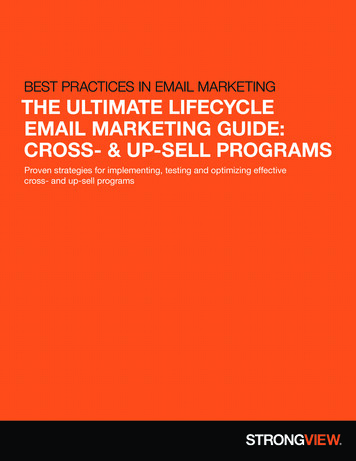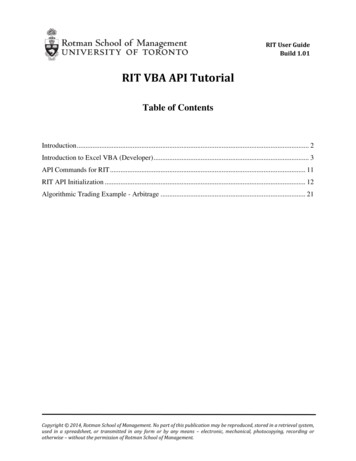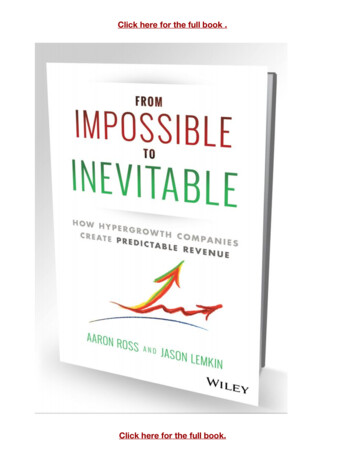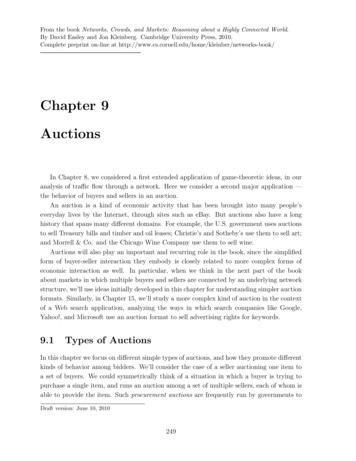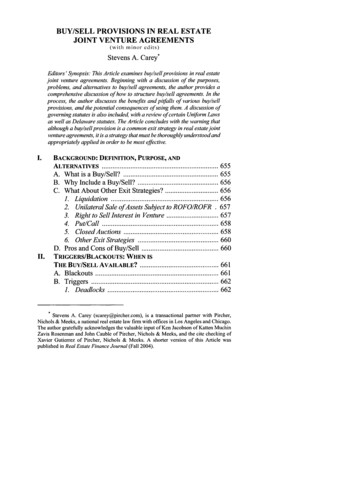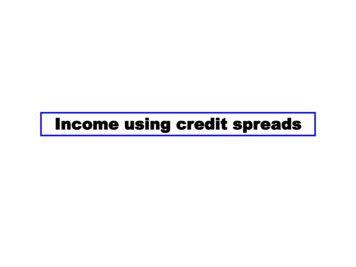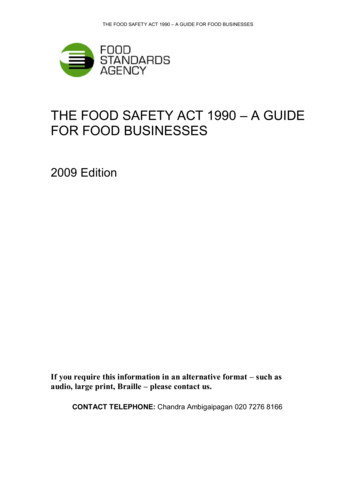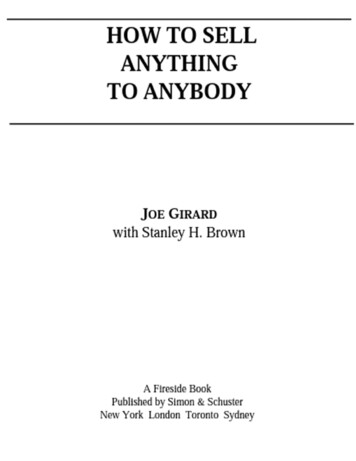
Transcription
How to Sell Anything to Anybody“It would be safe to say that Joe Girard is to the automobile businesswhat Ty Cobb is to baseball.”—P. M. Novell, general sales manager, Ford Division, Ford Motor Company“Our favorite illustration of closeness to the customer . Joe seems to genuinelycare.”—from In Search of Excellence by Thomas J. Peters and Robert H. Waterman,Jr.Praise for Joe Girard,the world’s greatest salesman!“The consummate salesman.”—Forbes“Enthusiastic and motivating!”—Deloitte & Touche “Joe Girard is something SPECIAL.”—Newsweek“An outstanding success, [Joe Girard] is truly #1!”—John Deere Company “Elevated our spirits and gave us inspiration and hope.”—Yamaha Motorcycle Corp.“Made us aware of what attitude is toward success.”
—Sea Ray boatsALSO BY JOE GIRARDHow to Sell YourselfHow to Close Every SaleMastering Your Way to the Top
HOW TO SELLANYTHINGTO ANYBODYJOE GIRARDwith Stanley H. Brown A Fireside BookPublished by Simon & SchusterNew York London Toronto Sydney FIRESIDERockefeller Center 1230 Avenue of the Americas New York, NY 10020www.SimonandSchuster.comCopyright 1977 by Joe Girard and Stanley H. Brown Copyright renewed 2005 by Joe Girard All rights reserved, including the right of reproduction inwhole or in part in any form.First Fireside Edition 2006FIRESIDE and colophon are registered trademarks of Simon & Schuster, Inc.For information regarding special discounts for bulk purchases, please contactSimon & Schuster Special Sales at 1-800-456-6798 orbusiness@simonandschuster.com.Designed by Jaime Putorti Manufactured in the United States of America10 9 8 7 6 5 4 3 2 1The Library of Congress has catalogued the hardcover edition as follows: Girard,Joe.How to sell anything to anybody / Joe Girard with Stanley H. Brown.
p. cm.1. Girard, Joe.2. Sales personnel—Biography.3. Selling.I. Brown, Stanley H.II. Title.HF5439.5.G57 A33 658.85 77-21683ISBN-13: 978-0-7432-7396-1eISBN: 978-1-43913667-6ISBN-10: 0-7432-7396-6
DedicationTo my sainted mother in Heavenfor the love that saved my lifeand helped me believethat I was a worthwhile human being
Contents1 Introduction2 The End of a Loser, the Beginning of a Winner3 It All Begins with Want4 The Mooch Is a Human Being5 Girard’s Law of 2506 Don’t Join the Club7 What Do You Do After You Sell Your Uncle Harry?8 Fill the Seats on the Ferris Wheel9 Girard’s Toolbox10 Getting Them to Read the Mail11 Hunting with Birddogs12 Knowing What Youre Doingand Why13 Honesty Is the Best Policy14 Facing the Customer15 Selling the Smell16 Espionage and Intelligence17 Locking Them Up18 Winning After the Close
19 All the Help You Can Get20 Spending and Getting21 There Is No Last
1IntroductionYou’ve got this book in your hands because you think it can help you get moreout of your work—more money and more personal satisfaction. This probablyisn’t the first book about selling that you have read. Chances are you have seenand read a lot of other books, books that promise to give you the “secrets,” themagic, the inspiration. You probably already know a lot about how to hypeyourself by looking in the mirror every morning and repeating certain phrases toyourself. By now you know the mysteries of “PMLA” and “HPD” and someother magical-power expressions and attitude builders. You know a lot aboutwhat you should think and what you shouldn’t think, positive and negative. Andmaybe you are a little confused by this time from all the contradictory advice thebooks have offered.I don’t want to take anything away from the promoters, the experts, and the otherwell-meaning people who grind out all those books. They have to make a livingtoo.But let’s face it. What you want to know is how to sell real products and servicesnow. And most of those authors never sold very much in their lives, except theirbooks. They may be professional writers or professional sales training experts.Some of them may have spent a few weeks or months selling something untilthey figured out something at which they were better. And maybe one of themmade a good living selling one multimillion-dollar real estate development everytwo years, which has nothing to do with the kind of selling you do and want todo better.That’s the point. They just aren’t our kind of salesman, out there selling everyday for a living. They don’t do it because they have to. When you read theirbooks, they sound fine. And they probably give you a little help, maybe even
enough to earn back what they cost you. But when you think about those books,you realize pretty soon that these writers—even the best of them—just aren’t ourkind of salesman.But I am. I sold cars and trucks. New ones, at retail, no fleet deals, just new carsand trucks, one at a time, face to face, belly to belly, to the same kind of peopleyou sell to, every day. Maybe you sell cars or suits or houses or appliances orfurniture or something else, day in and day out, something that you have to sell alot of to make out. And when you read these books by the experts, you probablyhave the same gut reaction I do: There’s something missing. What is missing,your intuition tells you, is first-hand, on-the-job involvement with our problems,our people, our world. Those guys just don’t feel like they’ve been out there inthe trenches every day the way we have to be if we’re going to eat tomorrow.That’s why my book is different. That’s why this book is going to work for youin ways that the others never did. Because I was out there every day the way youare. I did what you do. I felt what you feel. I wanted what you want. And I got it.Other people have been called the world’s greatest salesman. But they aren’t ourkind of salesman. Among our kind of salesman, I am the world’s greatest. Youdon’t have to take my word for that claim. If you want to check me out, take alook at the world’s foremost authority, the Guinness Book of Records. To prove Iam not A.T.A.N.A. (all talk and no action) like the others that say they are #1with their self-proclaimed records, my claim was audited by one of the topauditing firms, Deloitte & Touche (letter available upon request). Look up theworld’s greatest salesman. You’ll find that it’s me, Joe Girard. Or check storiesabout me in Newsweek, Forbes, Penthouse, and Woman’s Day, or in hundreds ofother magazines and newspapers. You’ve probably seen me on one or anothernational television show in recent years. And they always introduce me as “theworld’s greatest salesman” as attested by the Guinness Book of Records.How well did I do after I started selling in 1963? In my first year, I sold only 267
cars. Only! Even those days that would be more than just a living. In that firstyear, I was maybe the top guy in the dealership. In 1966, my fourth year, I sold614 cars and trucks (retail). This is the year I became NUMBER ONE RETAILCAR AND TRUCK SALESMAN IN THE WORLD. And every year since, Iwas the NUMBER ONE RETAIL CAR AND TRUCK SALESMAN, increasingmy business better than 10 percent a year and some years as high as 20 percent,even when we had bad recessions, layoffs, and long strikes. In fact, the worse theeconomy got, the smarter I worked and the better I did. I have stayed on top evenwhen the auto dealers in the Detroit area cut the workweek from six days to five.In 1976, which was my biggest year, I had gross earnings from commissions inexcess of 300,000. Not too many beat me, except maybe those guys who spendthree years paying off some cabinet minister in some country to buy theirairplanes or missiles. But that’s not the kind of selling you and I are talkingabout.What we are talking about is a profession that uses skills and tools andexperience and practice. It brings us lots of headaches and frustrations, no matterhow well we do. But when we do it right, it brings us more financial andemotional pleasure than any other kind of work in the world. I did what I didbecause I love the money and the excitement and the satisfaction of winningagain and again and again.You may already be doing pretty well. You may have a home, a vacation place,a boat, and a couple of cars. But if you have read this far, you think there is moreto be had than that. And you’re right. There is more of all the kinds of pride andsatisfaction every good salesman should feel. In fact, the better you are, the moreyou should want. If you think you have enough of everything, then you aren’tdoing as well as you could, so keep on reading. Because I have a total system forselling that is a lot like farming in a country where things grow all the time. Withmy system, you do a lot of things that are like planting seeds. You do them all
the time, and then you begin to harvest—all the time. And every time you haveharvested a sale, you plant something else. You plant and plant and harvest andharvest—all the time—through every season. There is nothing like it. I guaranteeit.But if you think that there is nothing you can do to sell and win, because you’rea loser, let me tell you that I was a bigger loser than you have ever been.For the first 35 years of my life I was the world’s biggest loser. I got thrown outof high school. I got thrown out of about 40 different jobs. I lasted only 97 daysin the U.S. Army. I couldn’t even make it as a crook. I tried twice. The first timeI wound up with nothing but a night of terror in juvenile detention. The secondtime the charges against me were dismissed for lack of evidence. And when Ifinally got into a business where I was making a small but fairly steady income,the first time I tried to expand I wound up facing bankruptcy, owing moremoney than I had ever seen, because I believed somebody who had no reason totell me the truth.How I got from there to here is what this book is about. This book is not beingwritten by a spectator with a fancy title and a lot of degrees. This is being writtenby a working salesman who was in the front lines every day selling. Even when Itravel around the country giving talks to other salesmen, I am selling, becausesalesmen have to be sold that the people who show them how to do it know howto do it because they did it. The story of how I got to be the world’s greatestsalesman gives me an enormous amount of pride. But I get even more from theletters I receive from working salesmen who meet me and hear me talk and thenwrite telling me how I have changed their lives by making them better, happier,more prosperous salesmen.WINNING BLOODLESS VICTORIESRemember that for a real salesman there is nothing better than selling. It is likehome runs for a hitter, touchdowns for a running back, victories for a general.
But when a salesman sells there are no losers. Both the buyer and the seller winif it’s a good sale. The confrontation that leads to a sale is like a game or a war,but one where nobody bleeds, nobody loses, everybody wins. What’s better thanthat?But the process that leads to that victory should start long before you ever seeyour prospect for the first time. And it goes on long after the customer signs theorder, pays, and leaves with his purchase. In fact, if you think the sale endswhen, like they say in the car business, you see the customer’s taillights, you’regoing to lose more sales than you ever dreamed of. But if you understand howselling can be a continuing process that never ends, then you’re going to make itto the big time.Once my selling system got into high gear, I never had to look for customersamong the people who walk into the front door of the showroom. I didn’t take“ups.” All my customers in those days were people who asked for me by name.All of them. And for every 10 sales I made, roughly 6 of them were to people Isold at least once before. And we’re talking about automobiles. People buy themabout every three or four years, and even less often among the middle-andworking-class people who were most of my sales. If you’re selling clothes orbooze or things that people buy a lot more often, getting them back again andagain is even more important. But it is harder to do with cars. So if I can showyou the ways I kept people coming back to buy cars from me, you know it’sgoing to mean even more sales for you if you’re selling these other kinds ofproducts and services where success depends even more on bringing them backagain.I guarantee you that my system will work for you, if you understand it andfollow it. I looked at selling situations and customers in different ways than Ionce did. This means that I have changed my attitude about a lot of aspects ofmy profession. I know there are a lot of people who talk about the importance of
attitudes. They tell you that if you change your attitude toward something theyhave put CAPITAL LETTERS on, then everything will be just dandy for you.Most of these people are sincere but they aren’t out there selling face-to-face dayafter day.Let’s face it. We live in the real world, and it is a very tough world. Whateveryou are selling, there is probably somebody else out there selling one exactlylike it. Not probably. It’s a fact. It is a very competitive world. And, aside fromthe thousands of Chevy salesmen who are trying to sell exactly the same car toexactly the same customers as I was, there are hundreds of thousands of othersalespeople trying to take the same money from them for everything fromfurniture, houses, swimming pools, and motorboats to vacation trips, tuition, andsavings accounts. And when you finally get the customer to come in, he islooking to hustle you in some way, not because he is a bad person but becausehe has come to believe that you are. It is a very tough profession we havechosen, but if we choose to deal with it as a profession with rules and standardsand principles, it can be made to pay off in financial and emotional satisfaction.The first thing you’d better know—if you don’t know it already—is that this isnot always a nice world. Competition is a tough game, but everybody competeswith everybody else for everything you and they want. I am no philosopher, but Iknew that almost from the day I was born. And it is one of the few things Ilearned before the age of 35 that turned out to be useful to me. What I am tryingto say is that the so-called experts are putting ideas in your way that you willeither have to get rid of or reshape before they can help you make more moneyand have more satisfaction from selling.It is a very tough, competitive world. But when I say that, I don’t mean that youare going to have to cheat or steal to survive. Stick with me and you will seewhat I do mean. You will see how you can change people by selling them theright way, my way, and wind up with their money and their friendship. In fact, if
you don’t get both their money and their friendship, you are not going to be inbusiness very long. Don’t get me wrong: When I talk about friendship, I am nottalking about goody-goody things like Love Thy Neighbor. How you get alongwith your neighbor is strictly your business. But when you get to the chapter onthe Law of 250 you will understand exactly what I mean by friendship. We aregoing to deal with the kinds of attitudes customers have toward salesmen and theimportance of telling the truth and the value of certain kinds of lies. If you don’tunderstand whom you’re dealing with and what they really want to hear, thenyou can’t make it in the long run. I assure you of that.But even before we get to the business of your customers’ attitudes, we aregoing to have to deal with your own. Remember that I was a total loser for 35years, which I am going to describe with enough detail so you’ll start to feelsorry for me, like I felt sorry for myself. But I’ll tell you right now that feelingsorry for yourself is a trap. It guarantees that you’ll keep on losing. It killseverything that it takes to be a winner in the war of life and of selling. I’ll showyou that too. And I’ll show you how I went from being a loser to being a bigwinner, the world’s greatest salesman, like it says in the book. I did it all bymyself. I’ll tell you and show you how I did it. And you’ll be able to see whatyou are doing in your own life that is defeating you and that can be turnedaround to make you a big winner.I mean that. You’ll have to do it to yourself and for yourself. Nobody can do itfor you. But I believe that I can show you what I did with my life—and why Idid it—so that you can be guided by it to look at yourself and your life and learnto turn the disadvantages into advantages, the liabilities into assets, the failuresinto successes, the defeats into victories.Once you have come to that point, you get a set of attitudes built into your head.I know that most of those so-called experts tell you to do it the other wayaround. That is, they give you the words, the attitudes that you ought to have,
and they tell you to develop them. They tell you to make yourself believe themby repeating them every morning when you get up or by saying them to yourselfin the mirror or some such thing as that.THE WAY TO WINNING ATTITUDESBut if you do that without knowing why or how, it’s not going to be worth anymore than squeezing a rabbit’s foot or rubbing a lucky piece. The only way tohave the right attitudes is to know what the wrong ones are and how you gotthem and why you keep them. And I am going to lead you through the story ofmy attitudes: the wrong ones, and then the great change in my life that led me tothe right ones. Don’t get the idea that I’m referring to some magical momentwhen a finger from heaven touched me. The change in my life came for a lotdifferent and more understandable reasons, as you will discover.I am not saying that what I went through was easy, but I did it. And if I could doit, coming from where I came from, anybody who is sick and tired of being aloser can do it. I guarantee that too. But you have to build in your own version ofthe right attitudes as the first step. Then you will understand the other rules andparts of my system, and why they work if you work them properly andconsistently. The Law of 250 will make it clear why you will want to use thesystem all the time. When we get to the use of time, you will understand not justthe obvious facts about the value of time and the cost of wasting it, but also theimportance of being realistic about yourself and what you can do, and how to begood to yourself in the long and the short run. When we get to certain aspects ofwhat I did, I will of course be talking about how I sold cars to people. I willrelate what I did to what salespeople in other fields do. A lot of it is obvious andyou can figure it out for yourself. When I say it is essential to get a customer totake a demonstration ride, you know, if you’re selling houses, that the equivalentis getting the people into the model. Or putting the suit on the customer. Or evencooking them a meal if you’re selling them a new kitchen. The old-time door-todoor vacuum cleaner salesman used to throw dust and dirt on the floor and then
run the vacuum to show how well it worked. The Club Aluminum salesmancooks a meal when he shows his line. A mattress salesman has got to get thecustomer to lie down. Those obviously are all equivalents of the demonstrationride in a new Chevrolet.But whatever I did and say that has to do with selling cars, there is almostalways an equivalent for selling anything else. Maybe a life insurance salesmancan’t get you to go to your own funeral like Tom Sawyer did, but he’ll get you totalk about your wife and children, and maybe get you to take out their picturesand leave them on the table while he is talking. This can be a hel-luva goodreminder that you’re not going to be around forever, and this may be all he needsto remind you of. It’s a kind of demonstration ride.From here on out, I am going to take you step by step through my discovery ofthe way to change from loser to winner. I’ll show you how I built in the attitudesof a sure winner and how those attitudes led me to the development of mysystem. And remember this: Those attitudes and that system have made me theWorld’s Greatest Salesman.
2The End of a Loser,the Beginningof a WinnerSomebody once told me that I was a born salesman. Let me tell you that’s nottrue. Some salesmen, maybe even most salesmen, may be born to it. But I wasnot born a salesman. I made me a salesman, all by myself. And if I could do it,starting from where I did, anybody can. Stay with this story and you’ll soon seewhat I mean.Lots of people start out poor, but the way it was where I was born was a specialkind of poor, maybe something like the kind of poor these days if you’re blackand poor. I was born November 1, 1928, on the lower east side of Detroit. Inthose days it was almost all what you would call Italian, but what I call Sicilian,because to me there’s a big difference. I’m proud to be a Sicilian, even though alot of people, including people from other parts of Italy, discriminate against usand try to make out that all of us are born into some kind of crime syndicate. Mystrong pride got me into a lot of trouble in my younger days, and evensometimes in recent years. I was pretty quick to fight anybody who called me“wop,” “dago,” or “greaser.” I know that everybody is prejudiced againstsomebody, but I have never liked it directed against me, and I’ve bloodied a lotof noses for being called “wop,” “dago,” or “greaser.”The first home I remember was an upper flat in a two-family house across thestreet from a coal yard. You would think it was a pretty lousy place if you livedacross from a coal yard. But it had one advantage. When things were reallytough in the wintertime, and the house was freezing cold, my older brother Jimand I could go across the street and I would crawl under the fence and throwhunks of coal to my brother, who would put them in a burlap bag. Then we’dhaul them home and put them in the furnace. Sometimes that was all there was to
burn, so it never bothered us that the coal maybe belonged to somebody else.That’s the kind of world I was born into.The furnace was in the cellar, but I remember the cellar for another reason. Itwas my father’s favorite place to beat me from as early as I can remember. Iguess I was as good and bad as most little kids, nothing special. So I never knewwhy he did it to me and not to my brother or my two younger sisters. But he didit. Mostly he would take me down there and tie me to a pipe, and then he’d beatme with one of those big leather straps he used to sharpen his razor. Any timeany of the kids made any noise or anything, it was me that got it. Down to thecellar, and him hollering as he whipped me, You’re no good, you’ll never benothing, you’re gonna go to jail—stuff like that. And I never could figure outwhy me, but he never stopped as long as I lived at home.Sometimes I’d run away a few blocks to the railroad yard down by the river andhide out in the boxcars. Once in a while, I’d even sleep on the straw-coveredfloors of freight cars. And when I’d come home, he’d beat me again and tell me Iwas no good and would never amount to anything, and that I’d end up inJacktown (what we called the state prison in Jackson, Michigan, where a lot ofguys from the neighborhood went).I’ll tell you one thing. If you grow up in a house where your father is the boss,and he tells you you’re no damn good from the earliest time you can rememberand beats you hard while he’s telling you, you believe it. After all, he’s the onlyfather, the only authority you know, and he must be right. After a while, I startedbelieving it, even though my mother used to come down to the cellar afterwardand tell me that I really was a good boy. That helped some, I guess, but she wasnot the boss like my old man, so, as much as I loved her, I still believed that Iwas no good and never would be worth anything. I believed it for a long time,and it had a lot to do with what happened to me, what I did to myself, for mostof my life.
I have tried to figure out what it was that made him hate me and pick on me anddump on me that way all the time. He came from Sicily as a young man,uneducated, practically illiterate, and poor. His own father had been a tyrant whocursed and beat him. My father was 25 when he married my mother. She wasonly 15, and her mother was not too happy about her marrying my father.Nobody ever told me what was going on in those days, but a feud startedbetween my father and my mother’s mother that never ended as long as he lived.My father wouldn’t let any of us, including my mother, have anything to do withmy grandmother, even when she lived in the same two-family house. My motherused to sneak into the cellar and talk to her through a partition sometimes. And Iwould visit her too, because we were very close friends, maybe because of howmy father felt about us. Whenever my father found out that I was seeing hisenemy, bam, the beating and the hollering and the cursing began again.You’re probably wondering what this has to do with how to sell. Well, it haseverything to do with how attitudes get planted in your head. And what gotplanted in my head was that I was no good and that I wouldn’t amount toanything. I believed that, and I was going to prove that my father was right.After all, you’re supposed to honor and obey your father. But there was anotherattitude planted there too, from the same beatings and cursings. There was thisfeeling of wild anger against him and wanting to prove to him that he waswrong, so he’d love me like he loved my brother and my sisters. Sometimes oneattitude operated, sometimes the other one, and sometimes they canceled eachother out.My father was never able to get much work. After all, it was the Depression andwe were Sicilians in Detroit and he had no trade, nothing. Mostly he was laid offor on the WPA. We were almost always on welfare (which they called relief inthose days), and about the only happy times I can remember were aroundChristmas when the Goodfellows (a local charity) would send us this box of toysthat people had contributed. Mostly they were used and repaired, but it was a big
thrill. And even better was the coupon they gave that we could take downtownand exchange for a pair of new shoes. That was a very big deal to me in thosedays.When I was around eight years old, I started working. A few blocks from wherewe lived there were a lot of factories. U.S. Rubber had a tire plant near the river,there was a big stove factory, and there were some furniture factories and someothers. All along East Jefferson Avenue, near these plants, there wereworkingmen’s bars. I built a shoeshine box and got some brushes and polishes (Idon’t remember where I got the money for them), and I worked those barsgiving shines. If you think you have earned money the hard way, let me tell youthat squatting on the floors of crummy saloons shining shoes for pennies willmatch whatever you’ve done. I’d start out in the afternoon after school when thefactories were letting out. I’d work all the bars along Jefferson for about a mile,and then I?d come back and start again, maybe more than once in a day. Myprice was a nickel, if I could get it. Sometimes I?d get a tip of an extra penny ortwo, and sometimes I couldn?t even get more than two cents for the whole shine.After a while, I developed some tricky moves like tossing the brushes in the airand changing hands. People got to know me, and I’d get extra tips. In those daysof the 1930s, even one penny bought a lot of candy, and a nickel bought adouble-dip ice cream cone or a quart of milk.The second and third time along the street I’d see the same guys three or fourdrinks later. I saw what booze does to people just in the course of a few hours.Sometimes it would make them easier and maybe more generous, but a lot oftimes it just made them meaner. After all, these were men who had worked ahard day and were maybe scared they’d lose their jobs. There were moreworkers than jobs in those days, a lot more. And they had stopped off to unwindand unload their troubles before they had to go home to a poor and miserablehouse. Working those bars was pretty grim. But I’d work till maybe ten oreleven at night and come home with about a dollar, sometimes more. All of it
went to the family, and sometimes it was all the money that was coming in.When a plant was closed or there wasn’t much business for me for some otherreason and I only brought home a few cents, my father would holler at me andbeat me. Those nights I’d be afraid to go home. The fear of not doing well gotbuilt into me then, and I’d want to stay out later to do maybe a few more shines.It was a lousy kind of childhood, but I never want to forget it. That’s why I keepa big picture of me at age nine on my knees shining a shoe. I have it hanging onthe wall of my office so I won’t forget what I started from. I hated it, but I’mproud of it.MY FIRST SALESMaybe there was a little selling experience in going around and practicallybegging guys to let me shine their shoes. I guess putting on my little act on thefloor with the brushes and all was a kind of selling pitch. But where I reallylearned about one aspect of selling was when I started delivering newspapers. I’dget up at about six o’clock in the morning and go to the garage where the DetroitFree Press copies were dropped off to be delivered in the neighborhood. I’d foldthem and carry them in a bag on my route, and then go to school and do theshine bit afterward.Where I really learned about selling, though, was when the paper had a contestfor new subscribers. For every one you signed up who stayed for at least amonth, you won a case of Pepsi-Cola. Now that was a very big deal to me. Acase of 24 12-ounce bottles of soda pop was really something. You talk aboutincentives and motivation. Boy, that really was it for me. I worked every houseand every apartment on every street I could find. I rang so many doorbells myfingers got sore. I may even have missed a day or two of school during thatcontest. But I was persistent. I’d say,
How to Sell Anything to Anybody "It would be safe to say that Joe Girard is to the automobile business what Ty Cobb is to baseball." —P. M. Novell, general sales manager, Ford Division, Ford Motor Company "Our favorite illustration of closeness to the customer . Joe seems to genuinely care."


